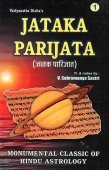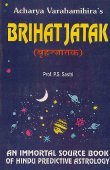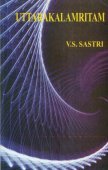Ayurdaya, Āyurdāya: 7 definitions
Introduction:
Ayurdaya means something in Hinduism, Sanskrit, Marathi. If you want to know the exact meaning, history, etymology or English translation of this term then check out the descriptions on this page. Add your comment or reference to a book if you want to contribute to this summary article.
In Hinduism
Jyotisha (astronomy and astrology)
Source: Wisdom Library: Brihat Samhita by VarahamihiraĀyurdāya (आयुर्दाय) refers to the “period of one’s existence”, according to the Bṛhatsaṃhitā (chapter 2), an encyclopedic Sanskrit work written by Varāhamihira mainly focusing on the science of ancient Indian astronomy astronomy (Jyotiṣa).—Accordingly, “We shall now proceed to give a brief description of (the qualifications of) a jyotiṣaka. [...] He must know the temperament of the planets; the parts of the body lorded over by each; the mineral division of each; the caste, sex and authority of each and the like; he must be able to state, from the time of conception or birth of a person, particulars connected with these occasions so as to insure belief; he must be able to say in what cases a child will die in infancy, and to calculate the period of one’s existence [i.e., āyurdāya]; he must be able to divide one’s life into planetary divisions and sub-divisions; [...]”.

Jyotisha (ज्योतिष, jyotiṣa or jyotish) refers to ‘astronomy’ or “Vedic astrology” and represents the fifth of the six Vedangas (additional sciences to be studied along with the Vedas). Jyotisha concerns itself with the study and prediction of the movements of celestial bodies, in order to calculate the auspicious time for rituals and ceremonies.
Languages of India and abroad
Marathi-English dictionary
Source: DDSA: The Molesworth Marathi and English Dictionaryāyurdāya (आयुर्दाय).—m (S) corruptly āyurdāva m The term or period of life, life-time.
Marathi is an Indo-European language having over 70 million native speakers people in (predominantly) Maharashtra India. Marathi, like many other Indo-Aryan languages, evolved from early forms of Prakrit, which itself is a subset of Sanskrit, one of the most ancient languages of the world.
Sanskrit dictionary
Source: Cologne Digital Sanskrit Dictionaries: Aufrecht Catalogus CatalogorumĀyurdāya (आयुर्दाय) as mentioned in Aufrecht’s Catalogus Catalogorum:—astrol. L. 1086.
Source: Cologne Digital Sanskrit Dictionaries: Monier-Williams Sanskrit-English DictionaryĀyurdāya (आयुर्दाय):—[=āyur-dāya] [from āyur > āyu] m. predicting the length of a man’s life from the aspect of the stars.
[Sanskrit to German]
Sanskrit, also spelled संस्कृतम् (saṃskṛtam), is an ancient language of India commonly seen as the grandmother of the Indo-European language family (even English!). Closely allied with Prakrit and Pali, Sanskrit is more exhaustive in both grammar and terms and has the most extensive collection of literature in the world, greatly surpassing its sister-languages Greek and Latin.
Kannada-English dictionary
Source: Alar: Kannada-English corpusĀyurdāya (ಆಯುರ್ದಾಯ):—[noun] the average life expectancy of the population of a nation, based on a sample of group of people.
Kannada is a Dravidian language (as opposed to the Indo-European language family) mainly spoken in the southwestern region of India.
See also (Relevant definitions)
Partial matches: Ayur, Daya, Taya.
Starts with: Ayurdayakoshtaka, Ayurdayatika.
Full-text: Grahadaya, Pancasharanirnaya.
Relevant text
No search results for Ayurdaya, Āyurdāya, Ayur-daya, Āyur-dāya; (plurals include: Ayurdayas, Āyurdāyas, dayas, dāyas) in any book or story.
Related products


